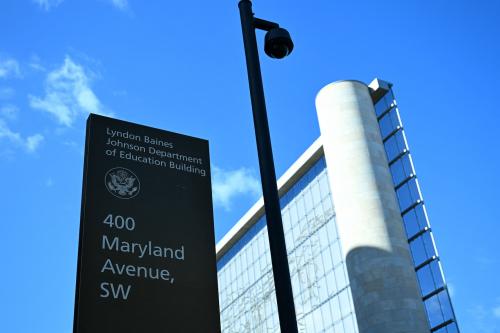

10:00 am EST - 12:00 am EST
Past Event
10:00 am - 12:00 am EST
1775 Massachusetts Avenue, N.W.
Washington, DC
20036
No other issue in education generates as much controversy as school vouchers.
Many parents — especially parents whose children attend bad public schools — enthusiastically support publicly-funded vouchers that can be used to pay tuition for their children at good private schools. Supporters of vouchers argue that they give parents the opportunity to give their children a good education and that they encourage the improvement of public schools through healthy competition.
Critics, on the other hand, believe that vouchers undermine the public school system by diverting revenues. This year, voters in at least two states, California and Michigan, are likely to vote on proposals establishing voucher programs. The campaigns on that issue promise to be bitter and expensive. Meanwhile, the Supreme Court has not yet spoken clearly on the constitutionality of voucher programs.
Charter schools, on the other hand, enjoy broad political support. Charters are schools supported with public funding but freed from most government regulation. Both political parties endorse expanding charters beyond the 1,700 schools currently in operation. But little is known about their effect on student learning. The first charter schools were founded in the early 1990s. As the schools? contracts come up for renewal, scholars are learning more about their effectiveness, as well as the challenges remaining.
Join us on February 24, 10:00 a.m. at The Brookings Institution to hear distinguished education scholars discuss the latest research on these two timely topics. The meeting will be held in the Stein Room on the second floor.
Ted Fiske and Helen Ladd have recently returned from New Zealand, where they studied that nation’s experiment with vouchers in depth. Their new book, When Schools Compete: A Cautionary Tale, reports on what they learned about the benefits and problems of school vouchers and the most important lessons the U.S. can learn from the New Zealand experience. Chester Finn, Jr. and Bruno Manno have studied charter schools for several years, and their new book, Charter Schools in Action: Renewing Public Education, offers a penetrating analysis of where the charter experiment stands today. Bryan Hassel, author of last year’s, The Charter School Challenge, has worked with dozens of educational entrepreneurs to get charter schools up and running.
View the transcript of our live interactive chat session with Tom Loveless on the voucher issue.

Sarah Reber, Zaria Roller, Quinn Sanderson
July 15, 2025

Robert Kim, Derek Black, Suzanne Eckes, Preston Green III, Rachel M. Perera
July 15, 2025

Nora Gordon
July 15, 2025